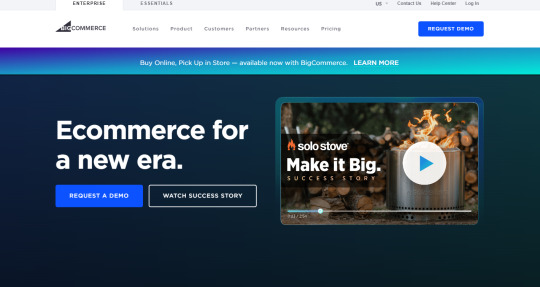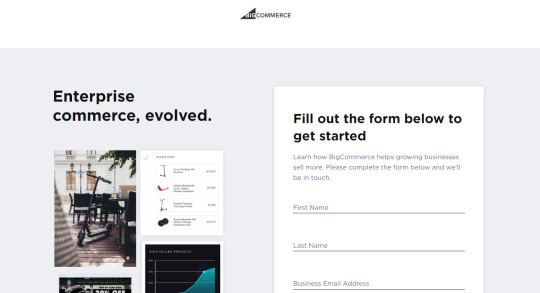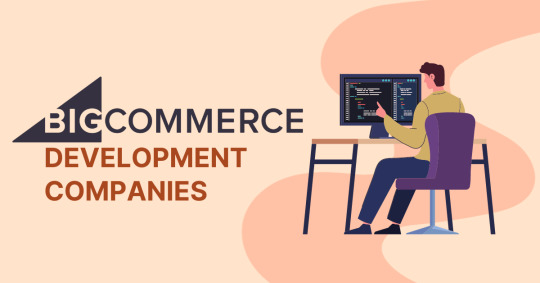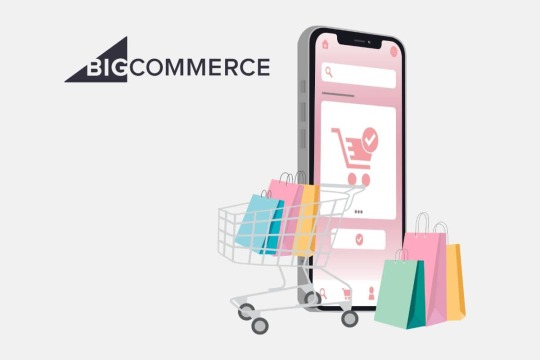#BigCommerce Theme
Text
Top 10 Fastest BigCommerce Themes for Faster Loading Speed
In the competitive world of online business, every millisecond counts. Studies have shown that users are more likely to abandon a website if it takes more than a few seconds to load. That’s why choosing the right BigCommerce theme is crucial for ensuring a fast and smooth browsing experience for your customers. In this article, we’ll explore the top 10 fastest BigCommerce themes that can help boost website’s loading speed.
Read full article - https://medium.com/@makkpress01/top-10-fastest-bigcommerce-themes-for-faster-loading-speed-88217605d2ee
0 notes
Text
Bigcommerce Theme Development Company

SoftGrid Computers specialises in BigCommerce theme development, crafting bespoke digital storefronts that captivate and convert. With a meticulous focus on user experience and branding, our team seamlessly integrates your vision with Big Commerce's robust platform, ensuring every pixel reflects your unique identity.
0 notes
Text
Building Your Online Store: Tips and Tricks for BigCommerce Development
In an era where e-commerce has become an integral part of the retail landscape, having a robust online store is essential for any business looking to thrive. BigCommerce, one of the leading e-commerce platforms, offers a powerful solution for building and managing your online store. In this article, we'll explore some tips and tricks for BigCommerce development to help you create a successful online presence that drives sales and customer satisfaction.
Understanding BigCommerce
Before we delve into tips and tricks, let's first understand what BigCommerce is and why it's a popular choice for e-commerce development.
BigCommerce is a cloud-based e-commerce platform that provides businesses with everything they need to set up, manage, and grow their online stores. It offers a range of features, including customizable templates, secure hosting, and a user-friendly interface. BigCommerce is known for its scalability, allowing businesses of all sizes to create and grow their online presence effectively.
Now, let's move on to the tips and tricks that can help you make the most of BigCommerce development.
Choose the Right Template
The design of your online store plays a significant role in attracting and retaining customers. BigCommerce offers a wide selection of templates to choose from. When selecting a template, consider the following:
Mobile Responsiveness: Ensure that the template is mobile responsive. With the increasing use of smartphones, a mobile-friendly design is essential.
Customizability: Look for a template that allows for easy customization. This will help you create a unique and branded online store.
Loading Speed: A fast-loading template is crucial for providing a seamless user experience. Slow-loading pages can lead to higher bounce rates.
SEO Optimization: Check if the template is optimized for SEO. A template that is search engine-friendly can help improve your store's visibility on search engines.
Optimize for Speed
Page loading speed is a critical factor for e-commerce success. Slow-loading pages can frustrate visitors and result in lost sales. To optimize your BigCommerce store for speed, consider the following:
Image Compression: Compress and optimize your product images to reduce their size without compromising quality.
Content Delivery Network (CDN): Implement a CDN to serve your content from servers located closer to your visitors, reducing loading times.
Minimize HTTP Requests: Reduce the number of HTTP requests by minimizing scripts and stylesheets.
Use Browser Caching: Implement browser caching to store frequently accessed resources on visitors' devices.
Regularly Audit Plugins and Apps: Review and remove any unnecessary or resource-intensive plugins and apps.
Implement SEO Best Practices
Search engine optimization (SEO) is crucial for driving organic traffic to your online store. BigCommerce provides several SEO features that can help you rank higher on search engine results pages:
Keyword Optimization: Conduct keyword research and optimize product titles, descriptions, and meta tags with relevant keywords.
Create Quality Content: Write informative product descriptions and blog posts that offer value to your customers and include keywords naturally.
Optimize Images: Use descriptive file names and alt text for images to improve your store's visibility in image search results.
XML Sitemaps: Ensure your store has XML sitemaps to help search engines index your pages more efficiently.
Provide a Seamless User Experience
A positive user experience can significantly impact your conversion rates and customer retention. Here are some tips to enhance the user experience in your BigCommerce store:
Simple Navigation: Make it easy for customers to find products by organizing them into logical categories and providing a search bar.
Clear Calls to Action (CTAs): Use prominent and clear CTAs like "Add to Cart" and "Checkout Now" to guide customers through the buying process.
Guest Checkout: Allow customers to make purchases as guests to reduce friction during the checkout process.
Responsive Design: Ensure that your store is fully responsive and offers a consistent experience across all devices.
Fast Checkout: Implement a one-page or quick checkout process to minimize cart abandonment.
Leverage BigCommerce Apps and Integrations
BigCommerce offers a wide range of apps and integrations that can enhance the functionality of your online store. Some popular integrations include:
Payment Gateways: Integrate popular payment gateways like PayPal, Stripe, and Square to offer diverse payment options to your customers.
Email Marketing: Utilize email marketing tools to build and nurture your customer base.
Inventory Management: Use inventory management apps to keep track of your stock levels and automate restocking when necessary.
Analytics and Reporting: Integrate analytics tools like Google Analytics to track and analyze visitor behavior on your site.
Secure Your Store
Security is paramount in e-commerce, as customers trust you with their sensitive information. BigCommerce offers robust security features, but you can take additional steps to ensure your store's safety:
SSL Certificate: Install an SSL certificate to secure data transmission between your store and customers.
Regular Updates: Keep your BigCommerce platform and all installed apps and plugins up to date to patch any security vulnerabilities.
Fraud Prevention: Implement fraud prevention measures to protect your business from fraudulent transactions.
Regular Backups: Schedule regular backups of your store to prevent data loss in case of unforeseen events.
Test and Iterate
Continuous improvement is key to success in e-commerce. Use A/B testing to compare different versions of your store to see which performs better. Test elements like product descriptions, images, and call-to-action buttons. Continuously gather feedback from customers and use it to refine your store's design and functionality.
Mobile Optimization
A significant portion of e-commerce traffic comes from mobile devices. Ensure that your BigCommerce store is not only responsive but optimized for mobile users. This includes having a user-friendly mobile interface, quick load times, and a streamlined checkout process.
Customer Support
Offer excellent customer support through various channels like live chat, email, and phone. Respond promptly to customer inquiries and provide detailed product information to assist them in making informed purchasing decisions.
Marketing and Promotion
Leverage online marketing strategies such as social media advertising, pay-per-click advertising, and content marketing to drive traffic to your store. Offer promotions, discounts, and loyalty programs to attract and retain customers.
Conclusion
Building a successful online store on the BigCommerce platform requires careful planning and execution. By following these tips and tricks, you can create a user-friendly, secure, and high-performing e-commerce site that attracts customers and drives sales. Remember that e-commerce is an ever-evolving field, so staying updated with the latest trends and technologies is essential for long-term success. With dedication and the right approach, your BigCommerce store can become a thriving online business.
1 note
·
View note
Text
E-commerce Success with Samyak Online's BigCommerce Development Services
In today's digital age, having a robust online presence is imperative for businesses to thrive. BigCommerce, a powerful e-commerce platform, offers a gateway to success in the world of online retail. If you're looking to harness the full potential of BigCommerce, Samyak Online is your trusted partner. Let's explore how our BigCommerce development services can transform your e-commerce journey.

BigCommerce Store Development: Building the Foundation for Success
Your online store is your digital storefront, and its design and functionality matter more than ever. Samyak Online specializes in crafting bespoke BigCommerce stores that not only look stunning but also provide seamless user experiences. Our BigCommerce store development services are tailored to your unique business needs, ensuring that your online presence stands out in a crowded marketplace.
BigCommerce Theme Development: Your Brand, Your Vision
Your brand identity deserves to shine through your online store. Samyak Online's BigCommerce theme development services help you achieve just that. We create custom themes that align perfectly with your brand's personality and vision, ensuring that your customers have a memorable and visually appealing shopping experience.
BigCommerce E-commerce Development Services: Beyond the Basics
At Samyak Online, we go beyond the basics. Our BigCommerce e-commerce development services encompass a wide range of functionalities, from payment gateway integrations and third-party app installations to inventory management and order processing automation. We empower your online store to function seamlessly, giving you the freedom to focus on growing your business.
BigCommerce Development Agency You Can Trust
Choosing the right development partner is critical for your e-commerce success. Samyak Online's team of experienced professionals has a proven track record in delivering top-notch BigCommerce solutions. We are committed to your success, and our BigCommerce development services are designed to help you achieve your online business goals.
In conclusion,
When it comes to BigCommerce development services, Samyak Online is your go-to partner. Our expertise, commitment to excellence, and customer-centric approach set us apart as a leading BigCommerce development agency. Take your e-commerce journey to new heights with us by your side. Contact Samyak Online today and unlock the potential of BigCommerce for your business.
Source: https://web-design-service.medium.com/e-commerce-success-with-samyak-onlines-bigcommerce-development-services-53f03028911c
#BigCommerce development services#BigCommerce store development services#BigCommerce theme development services#BigCommerce e-commerce development services#BigCommerce development service
0 notes
Text
Which is best, Shopify or BigCommerce?
Read Here :-https://qr.ae/pyhGOo
#Hire Shopify Developers#Shopify Development Company#Shopify development services#Certified Shopify Developers#Hire Shopify Experts#Shopify theme customization#Shopify Partner Login#hire expert shopify developer#Hire Bigcommerce Developers#BigCommerce Web Design Company#BigCommerce Development Company#BigCommerce Development Services#BigCommerce Web Developer#hire bigcommerce developers in Canada#Hire Bigcommerce Expert#bigcommerce development agency#bigcommerce app development
0 notes
Link
Want to build a beautiful store with the industry’s best templates? Here are the 10+ best free and premium BigCommerce themes to grow your business.
0 notes
Text
BigCommerce Review 2023: The Pros and Cons of this E-commerce Platform
BigCommerce is an ecommerce platform that has been around since 2009. It is a popular choice for businesses of all sizes due to its robust features and scalability. In this article, we will review BigCommerce in 2023, taking a look at its features, pricing, and performance.

BigCommerce Overview 2023: BigCommerce has come a long way since its inception. The platform has evolved to meet the changing needs of businesses, and its latest version offers a range of features designed to help businesses sell more. These features include a drag-and-drop website builder, blogging and SEO tools, and strong reporting functionality.
BigCommerce Performance and Reliability: BigCommerce is known for its performance and reliability. The platform is designed to handle high traffic and can scale as your business grows. Additionally, BigCommerce offers a range of security features to protect your business and your customers.
Key Takeaways
BigCommerce is a popular ecommerce platform that offers robust features and scalability.
The latest version of BigCommerce includes a drag-and-drop website builder, blogging and SEO tools, and strong reporting functionality.
BigCommerce is known for its performance and reliability, with the ability to handle high traffic and scale as your business grows.
BigCommerce Overview 2023
youtube
BigCommerce is an e-commerce platform that is designed to help businesses of all sizes sell their products online. It provides a range of features that can help businesses build, launch, and manage their online stores. In this section, we will take a closer look at the core features of BigCommerce, its ease of use, and design and customization options.
Core Features
BigCommerce offers a range of features that can help businesses build and grow their online stores. Some of the core features of BigCommerce include:
Product Management: BigCommerce allows businesses to easily manage their products, including adding new products, updating product information, and managing inventory.
Payment Processing: BigCommerce supports a range of payment gateways, including PayPal, Stripe, and Square, making it easy for businesses to accept payments from customers.
Shipping and Fulfillment: BigCommerce provides built-in shipping and fulfillment options, including integration with popular shipping carriers like USPS, FedEx, and UPS.
Marketing and SEO: BigCommerce includes a range of marketing and SEO tools, including email marketing, social media integration, and search engine optimization features.
Ease of Use
BigCommerce is designed to be easy to use, even for businesses without any technical experience. The platform provides a drag-and-drop website builder, making it easy for businesses to create and customize their online stores. Additionally, BigCommerce provides a range of tutorials and support resources to help businesses get started.
Design and Customization
BigCommerce provides a range of design and customization options, allowing businesses to create unique and professional-looking online stores. Some of the design and customization options available on BigCommerce include:
Themes: BigCommerce provides a range of free and paid themes that businesses can use to customize the look and feel of their online stores.
Customization: BigCommerce allows businesses to customize their online stores using HTML, CSS, and JavaScript, giving them full control over the design and functionality of their stores.
Integrations: BigCommerce integrates with a range of third-party apps and services, allowing businesses to add additional features and functionality to their online stores.
Overall, BigCommerce provides a comprehensive e-commerce platform that can help businesses of all sizes build and grow their online stores. With its range of features, ease of use, and design and customization options, BigCommerce is a strong choice for businesses looking to sell their products online.
BigCommerce Performance and Reliability
youtube
BigCommerce is a cloud-based e-commerce platform that offers a reliable and high-performance hosting environment. In this section, we will explore the platform's uptime and speed, as well as its security measures.
Uptime and Speed
BigCommerce boasts an impressive uptime record, with an average uptime of 99.99%. This means that the platform is available to customers almost all the time, ensuring that they can conduct their business without any interruptions. BigCommerce also claims to have a fast page load time, which is crucial for e-commerce websites. According to the company, its platform can load pages in under three seconds, which is faster than the industry average.
Security Measures
BigCommerce takes security very seriously and has implemented several measures to protect its customers' data. The platform is PCI compliant, which means that it meets the requirements set by the Payment Card Industry Security Standards Council. This compliance ensures that the platform is secure and that customer data is protected.
BigCommerce also offers SSL encryption, which is a security protocol that encrypts data between the web server and the user's browser. This encryption ensures that sensitive data, such as credit card information, is protected from hackers and other malicious actors.
In addition to these measures, BigCommerce offers two-factor authentication, which adds an extra layer of security to user accounts. This feature requires users to enter a code sent to their mobile device in addition to their login credentials, making it much more difficult for unauthorized users to gain access to their accounts.
Overall, BigCommerce is a reliable and secure e-commerce platform that offers fast page load times and an impressive uptime record. Its security measures ensure that customer data is protected, making it a great choice for businesses that prioritize security and reliability.
Frequently Asked Questions

What are the common criticisms faced by BigCommerce in 2023?
BigCommerce is a popular e-commerce platform, but it is not without its criticisms. One of the common criticisms faced by BigCommerce in 2023 is its limited customization options. Some users have reported that the platform's design options are not as flexible as they would like, making it difficult to create a truly unique online store. Additionally, some users have reported that the platform can be slow to load, particularly when dealing with large product catalogs.
How does BigCommerce pricing compare to its competitors?
BigCommerce offers three pricing plans for small businesses, with pricing that scales with additional features. The typical plans range from $29 to $299 per month. Compared to its competitors, BigCommerce's pricing is generally considered to be on the higher side. However, the platform's robust features and scalability make it a worthwhile investment for many businesses.
What makes BigCommerce stand out for B2B online retailers?
BigCommerce is well-suited for B2B online retailers due to its advanced features for managing complex pricing structures, customer groups, and order management. The platform's built-in B2B functionality makes it easy to create custom pricing tiers, set up negotiated pricing, and manage customer accounts. Additionally, BigCommerce's integration with popular B2B tools like Salesforce and Netsuite makes it a top choice for many B2B businesses.
What are the key benefits and drawbacks of using BigCommerce for small businesses?
One of the key benefits of using BigCommerce for small businesses is its scalability. The platform is designed to grow with your business, offering advanced features like multi-channel selling, inventory management, and shipping integrations. However, some users have reported that the platform can be difficult to use for beginners, and that the learning curve can be steep.
How does BigCommerce perform in terms of user satisfaction and employee experience?
According to user reviews on TrustRadius, BigCommerce has a high level of user satisfaction, with users praising the platform's robust features and scalability. Additionally, many users report that the platform's customer support team is responsive and helpful. In terms of employee experience, BigCommerce has been recognized as a great place to work, with a strong company culture and opportunities for professional growth.
In what areas does Shopify excel over BigCommerce, and vice versa?
Shopify and BigCommerce are both popular e-commerce platforms, but they have some key differences. Shopify is known for its ease of use and user-friendly interface, making it a great choice for beginners. Additionally, Shopify has a larger app store and more integrations than BigCommerce. On the other hand, BigCommerce is known for its advanced features and scalability, making it a better choice for larger businesses. Additionally, BigCommerce's built-in B2B functionality makes it a top choice for B2B online retailers.
BigCommerce LandingPage
22 notes
·
View notes
Text
Ten Steps Into The Development Of An E-Commerce

In the digital age, establishing an online presence through an e-commerce website is crucial for businesses to expand their reach and increase sales. The process of e-commerce site development requires careful planning, execution, and optimization to ensure a seamless and engaging shopping experience for customers. In this guide, we'll outline ten essential steps in the development of an e-commerce website, incorporating key strategies and leveraging advanced solutions like Xettle Technologies for enhanced functionality.
Step 1: Define Your Goals and Objectives
Before embarking on e-commerce site development, clearly define your business goals and objectives. Determine your target audience, product offerings, revenue targets, and desired features for the website. This foundational step will guide the entire development process and ensure alignment with your business objectives.
Step 2: Choose the Right E-commerce Platform
Selecting the right e-commerce platform is crucial for the success of your online store. Consider factors such as scalability, customization options, security features, and ease of use. Platforms like WooCommerce, Shopify, Magento, and BigCommerce offer robust solutions for e-commerce site development, catering to different business needs and budgets.
Step 3: Design a User-Friendly Interface
Design a visually appealing and user-friendly interface for your e-commerce website. Ensure intuitive navigation, clear product categorization, and seamless checkout process to enhance the user experience. Leverage responsive design principles to optimize your website for mobile devices and ensure accessibility across all screen sizes.
Step 4: Develop and Customize Your Website
Customize your e-commerce website to reflect your brand identity and meet the specific needs of your business. Choose a theme or template that aligns with your brand aesthetic and customize it with your logo, color scheme, and branding elements. Implement features such as product filters, search functionality, and customer reviews to enhance usability.
Step 5: Integrate Secure Payment Gateways
Integrate secure payment gateways to facilitate smooth and secure transactions on your e-commerce website. Offer a variety of payment options to cater to customer preferences, including credit/debit cards, digital wallets, and alternative payment methods. Ensure compliance with PCI DSS standards to protect sensitive customer information.
Step 6: Optimize for Search Engines
Implement search engine optimization (SEO) strategies to improve the visibility and ranking of your e-commerce website in search engine results. Optimize product descriptions, meta titles, and URLs with relevant keywords. Create high-quality content, optimize images, and build backlinks to attract organic traffic to your site.
Step 7: Implement Analytics and Tracking
Integrate analytics tools such as Google Analytics into your e-commerce website to track visitor behavior, monitor performance metrics, and gain insights into customer preferences. Analyze data on sales, traffic sources, conversion rates, and user engagement to make informed decisions and optimize your marketing strategies.
Step 8: Ensure Website Security
Prioritize website security to protect customer data and build trust with your audience. Implement SSL encryption, secure hosting, and regular security audits to safeguard against cyber threats and data breaches. Partner with reputable security providers and adhere to industry standards to maintain the integrity of your e-commerce website.
Step 9: Test and Iterate
Conduct thorough testing of your e-commerce website across different devices, browsers, and operating systems to identify and resolve any issues or bugs. Test functionality, performance, and usability to ensure a seamless shopping experience for users. Continuously gather feedback from customers and iterate based on their preferences and suggestions.
Step 10: Leverage Advanced Solutions like Xettle Technologies
Incorporate advanced solutions like Xettle Technologies to enhance the functionality and performance of your e-commerce website. Xettle offers AI-driven financial insights, predictive analytics, and personalized recommendations to optimize decision-making, improve customer engagement, and drive sales. By leveraging Xettle Technologies, you can stay ahead of the competition and deliver a superior shopping experience to your customers.
Conclusion
Building an e-commerce website requires careful planning, execution, and optimization to succeed in the competitive online marketplace. By following the ten essential steps outlined in this guide and leveraging advanced solutions like Xettle Technologies, you can create a feature-rich and user-friendly e-commerce website that attracts customers, drives sales, and fosters long-term success for your business. With continuous monitoring, optimization, and innovation, your e-commerce site will evolve to meet the changing needs and expectations of your audience, ensuring sustained growth and profitability in the digital era.
2 notes
·
View notes
Text
BigCommerce review and Enterprise
BigCommerce is a popular e-commerce platform that provides businesses with the tools and features needed to create and manage an online store. Here's a review of BigCommerce based on its features, ease of use, pricing, and overall performance.

Features: BigCommerce offers a comprehensive set of features designed to help businesses build and run successful online stores. It provides a wide range of customizable templates and themes to create a visually appealing store. The platform includes robust product management tools, inventory management, flexible shipping options, and multiple payment gateway integrations. It also supports various marketing and SEO tools, including email marketing, social media integration, and built-in SEO features.
Ease of Use: BigCommerce is generally user-friendly and provides an intuitive interface for managing your online store. The platform offers a drag-and-drop editor, making it easy to customize the look and feel of your store without needing extensive technical knowledge. It also provides a user-friendly dashboard that allows you to manage orders, track inventory, and analyze sales data. However, for more advanced customization options, some coding knowledge may be required.
Pricing: BigCommerce offers different pricing plans to accommodate businesses of various sizes. The plans range from Standard to Plus, Pro, and Enterprise, with varying features and limitations. Pricing is competitive compared to other leading e-commerce platforms, but it may be slightly higher for small businesses compared to some other options. It's important to consider your business's specific needs and budget when choosing a plan.
Performance: BigCommerce is known for its strong performance and scalability. The platform is designed to handle high-traffic volumes and provides reliable hosting, ensuring that your online store remains accessible to customers. BigCommerce offers built-in security features, including SSL certificates, to protect your customers' data. Additionally, the platform integrates with popular third-party applications and services, allowing you to extend its functionality and enhance your store's performance.
Customer Support: BigCommerce offers 24/7 customer support through various channels, including phone, live chat, and email. The platform provides extensive documentation, video tutorials, and a community forum to help users find answers to their questions. Overall, the customer support is responsive and helpful in resolving issues or providing guidance.
Conclusion: BigCommerce is a robust e-commerce platform that provides businesses with the necessary tools to build and manage an online store. With its comprehensive features, ease of use, strong performance, and reliable customer support, BigCommerce is a popular choice for businesses of all sizes. However, it's essential to consider your specific requirements and compare BigCommerce with other e-commerce platforms to determine the best fit for your business.
Enterprise

BigCommerce Enterprise is the advanced version of the BigCommerce e-commerce platform specifically designed to meet the needs of large-scale businesses. It offers a range of features and capabilities tailored for enterprises with high-volume sales, complex product catalogs, and advanced customization requirements. Here are some key features and benefits of BigCommerce Enterprise:
Scalability: BigCommerce Enterprise is built to handle high levels of traffic and large product catalogs, ensuring that your online store can scale as your business grows.
Customization: The platform provides extensive customization options, allowing you to create a unique and branded shopping experience for your customers. You have full control over the design, layout, and functionality of your store.
Advanced B2B Functionality: BigCommerce Enterprise includes powerful B2B features such as customer-specific pricing, customer groups, quote management, purchase order workflows, and flexible payment options tailored for B2B transactions.
Integration and APIs: It offers robust integration capabilities, enabling you to connect with third-party systems, tools, and services. This allows for seamless integration with ERP, CRM, fulfillment, and other business systems.
Security and Compliance: BigCommerce Enterprise prioritizes security and compliance, providing features such as advanced security options, secure checkout, and adherence to PCI DSS compliance standards.
Dedicated Account Management: Enterprise-level customers receive dedicated account management and priority support to ensure they receive personalized assistance and guidance.
Performance and Reliability: BigCommerce Enterprise provides reliable hosting infrastructure, fast page loading speeds, and high uptime, ensuring that your store remains accessible and performs well for your customers.
To learn more about BigCommerce Enterprise, including pricing and specific features, it's best to reach out to the BigCommerce sales team or visit their official website for the most accurate and up-to-date information. They can provide detailed insights into how BigCommerce Enterprise can meet your specific business requirements and discuss any customization or integration needs you may have.
Get Your Enterprise
#BigCommerceEnterprise#eCommerceSolution#OnlineRetail#EnterpriseCommerce#eCommercePlatform#OnlineBusiness#RetailSolutions#DigitalCommerce#B2BCommerce#eCommerceGrowth
3 notes
·
View notes
Text
How to Start Selling on the Internet: What Is E-Commerce?
https://sciencespies.com/humans/how-to-start-selling-on-the-internet-what-is-e-commerce/
How to Start Selling on the Internet: What Is E-Commerce?

Do you want to start selling products online but don’t know how? In this blog post, we will discuss e-commerce and how to get started. E-commerce is the process of buying and selling goods and services over the Internet. It has become a popular way for businesses to sell their products and services, and it is estimated that e-commerce sales will reach $4 trillion by 2020. In this blog post, we will discuss the basics of e-commerce and provide tips on how to get started.
Is it difficult to operate an online store?
These days it’s very easy, and that’s thanks to easy-to-use CMS systems. A CMS otherwise known as Content Management System, is a software application that helps you create and manage your website content. With a CMS, you can easily add products to your online store, create product pages, and accept payments. There are many different CMS systems available, and we will discuss some of the most popular ones in this blog post.
Woocommerce
Woocommerce is one of the most popular CMS systems, mainly used for small online stores. It is a WordPress plugin that turns your WordPress website into an e-commerce store. Woocommerce is easy to use and has a lot of features, such as product pages, shopping cart, and checkout.
Shopify
Shopify is another popular e-commerce platform that allows you to create an online store. It is easy to use and has a lot of features and themes. Shopify also has its own payment gateway, which makes it easy to accept payments.
BigCommerce
BigCommerce is a powerful e-commerce platform that is used by many large online stores. It has all the features you need to run a successful online store, such as product pages, shopping cart, and checkout. BigCommerce also has a lot of themes and plugins to choose from.
Sylius
Sylius is an e-commerce platform that is used by many large online stores. It has all the features you need to run a successful online store, such as product pages, shopping cart, and checkout. Sylius also has a lot of themes and plugins to choose from.
When you are ready to start selling products online, we recommend using one of the above CMS systems. They are all easy to use and have a lot of features to help you run a successful online store. If you have any questions or something is not clear to you, you should find the right software house to help you move your business to the Internet.
What is a software house?
A software house is a company that specializes in developing software applications. A software house can help you develop a custom e-commerce platform or plugin for your website. They can also help you with the design and development of your website. If you are not sure how to get started, we recommend finding a software house that specializes in e-commerce development.
How to find a good software house?
There are a few things you should consider when finding a software house to help you with e-commerce development.
First, you should make sure that the company has experience in developing e-commerce platforms and plugins.
Second, you should check the company’s portfolio to see if they have developed similar projects in the past.
Third, you should contact the company and discuss your project in detail.
After you have considered these factors, you should be able to find a good software house to help you with e-commerce development.
How to prepare for an interview with a software house?
If you are planning to interview with a software house, there are a few things you should keep in mind.
First, you should have a clear understanding of your project.
Second, you should have a budget for your project.
Third, you should be prepared to discuss the details of your project with the software house.
Fourth, you should have some questions prepared for the software house.
Fifth, you should be ready to negotiate the price for your project.
If you keep these things in mind, you will be well-prepared for your interview with a software house.
We hope this blog post has been helpful and that you now have a better understanding of e-commerce and how to get started selling online. If you have any questions or need help finding a software house, feel free to contact us. We would be happy to help!
This article was originally published by spinbits.com. Read the original article here.
#Humans
#2022 Science News#9-2022 Science News#acts of science#Earth Environment#earth science#Environment and Nature#everyday items#Nature Science#New#News Science Spies#Our Nature#planetary science#production line#sci_evergreen1#Science#Science Channel#science documentary#Science News#Science Spies#Science Spies News#September 2022 Science News#Space Physics & Nature#Space Science#Humans
2 notes
·
View notes
Text
what is an e commerce site
what is an e commerce site,
An e-commerce site, also known as an online store or online marketplace, is a website where businesses sell products or services to customers over the internet. It allows customers to browse through product listings, add items to their shopping cart, and complete transactions electronically.
E-commerce sites typically include features such as product catalogs, search functionality, secure payment options, shopping carts for storing selected items before checkout, and order management systems. They may also offer additional features like customer reviews and ratings, personalized recommendations based on past purchases or browsing history, and customer support channels.
E-commerce sites can range from small businesses selling niche products to large multinational corporations offering a wide range of goods across various categories. Some examples of popular e-commerce sites include Amazon, eBay, Walmart.com, Etsy for handmade products, and Alibaba for global trade.
To ensure a smooth user experience andsecure transactions, e-commerce sites often utilize secure protocols such as HTTPS and SSL certificates to protect sensitive customer information. They also implement payment gateways that allow customers to securely enter their credit card or other payment details.
E-commerce sites can be built using various platforms and technologies, ranging from custom-developed websites to content management systems (CMS) specifically designed for e-commerce, such as Shopify, WooCommerce (built on WordPress), Magento, and BigCommerce. These platforms typically offer templates and tools for designing the site’s layout, managing inventory, processing orders, and integrating with shipping carriers.
Overall, e-commerce sites have revolutionized the way businesses operate by providing a convenient way for customers to shop online from anywhere at any time. They enable businesses to reach a wider audience and compete in the global marketplace without the limitations of physical locations.
wordpress e commerce
WordPress is a popular content management system (CMS) that can also be used to build e-commerce websites. It offers a variety of e-commerce plugins and themes that allow businesses to create online stores without extensive coding knowledge.
One of the most widely used e-commerce for WordPress is WooCommerce. WooCommerce provides a comprehensive set of features for selling products or services online, including product management inventory tracking, secure payment gateways, and flexible shipping options. It also offers various extensions and integrations enhance the functionality of your online store.
To start an e-commerce site with WordPress and WooCommerce, you would typically need to:
1 Install WordPress: Set up a domain name, web hosting service, and install WordPress on your server.
Choosea theme: Select an e-commerce theme that is compatible with WooCommerce or specifically designed for online stores. There are both free and premium available.
Install WooCommerce: Install the WooCommerce plugin from the WordPress plugin directory and configure your store settings including currency, shipping options, tax settings, and payment gateways.
Customize your store: Customize the appearance of your e-commerce site by adding logos, changing colors, and adjusting layout options. You can also create product categories and add individual products with descriptions, images, and prices.
Set up payment gateways: Choose which payment methods you want to offer to customers, such as credit card payments or PayPal integration. Configure these payment gateways to securely process transactions on your website.
Configure shipping options: Set up shipping methods based on weight or geographic location and specify associated costs.
Add additional functionality: Explore extensions and plugins that enhance the functionality of your online store further. These can include features like advanced inventory management systems or integrations with marketing tools for email marketing campaigns or social media sharing buttons.
8 Test & Launch: Before officially launching your e-commerce site, thoroughly test all features such as placing test orders to ensure everything works smoothly. Once you are satisfied with the results, promote your website through various channels like social media or SEO strategies to attract customers to visit and make purchases on it.
WordPress provides a user-friendly interface for managing an e-commerce site while offering flexibility in design customization through themes and integrations via plugins.Websites built using WordPress can range from small-scale shops selling niche products to larger-scale marketplaces catering millions of users worldwide
e commerce
0 notes
Text
How to Choose the Right Ecommerce Platform for Your Business

Choosing the right eCommerce platform is a critical decision for any business venturing into online sales. With myriad options available, each offering unique features and benefits, selecting the right one can be daunting. However, by focusing on a few key factors, you can make an informed choice that aligns with your business needs and goals. Here's a comprehensive guide on how to choose the right eCommerce platform for your business, integrating essential aspects of eCommerce website development.
Understand Your Business Needs
Before diving into the various platforms, it's crucial to understand your business requirements. Ask yourself the following questions.
What is your budget? E commerce platforms range from free, open-source options to premium solutions with monthly fees. Determine how much you can afford to spend.
What are your sales goals? Consider your current sales volume and projected growth. Some platforms are better suited for small businesses, while others can handle high traffic and large product catalogs.
What features do you need? Make a list of must-have features such as payment gateways, shipping options, inventory management, and marketing tools.
Evaluate Platform Options
Here are some popular eCommerce platforms, each catering to different needs:
Shopify: Known for its user-friendly interface, Shopify is an excellent choice for beginners. It offers a wide range of templates and apps to enhance functionality. However, it charges transaction fees unless you use Shopify Payments.
WooCommerce: A plugin for WordPress, WooCommerce is ideal for businesses already using WordPress for their websites. It offers extensive customization options but requires some technical knowledge.
Magento: A powerful platform suitable for large businesses with high-volume sales, Magento offers robust features and scalability. However, it demands a higher level of technical expertise and a larger budget.
BigCommerce: This platform provides a comprehensive solution with no transaction fees and strong SEO capabilities. It's suitable for businesses of all sizes but might be more complex for beginners.
Squarespace: Best for businesses that prioritize design, Squarespace offers beautiful templates and integrates eCommerce functionalities. It's perfect for smaller businesses or creatives.
Consider Customization and Scalability
Customization is a vital aspect of eCommerce website development. Your platform should allow you to create a unique shopping experience that aligns with your brand. Platforms like WooCommerce and Magento offer extensive customization options, enabling you to modify almost every aspect of your site. Shopify and BigCommerce, while slightly more restrictive, still provide numerous apps and themes to tailor your site.
Scalability is equally important. As your business grows, your ecommerce platform should be able to handle increased traffic and a larger product catalog without compromising performance. Magento excels in this area, making it a preferred choice for large enterprises. Shopify and BigCommerce also offer scalability but with certain limitations in customization compared to Magento.
Assess Support and Resources
Ecommerce website development is an ongoing process that requires continuous support. Ensure that the platform you choose offers reliable customer support, whether through live chat, phone, or email. Additionally, check if they provide resources such as tutorials, forums, and documentation to assist you in resolving issues independently.
Security and Payment Options
Security is paramount in ecommerce. Your chosen platform should comply with the Payment Card Industry Data Security Standard (PCI DSS) to ensure safe transactions. Additionally, consider the variety of payment gateways the platform supports. Offering multiple payment options can enhance customer satisfaction and increase conversion rates.
Conclusion
Selecting the right ecommerce platform is a foundational step in ecommerce website development. By carefully evaluating your business needs, platform features, customization and scalability options, support, security, and total costs, you can choose a platform that not only meets your current requirements but also grows with your business. Investing time in this decision will pay off in the long run, providing a seamless shopping experience for your customers and robust growth for your business.
0 notes
Text
Elevate Your E-commerce Game with BigCommerce Development Services
Samyak Online is your trusted partner for BigCommerce store development, offering top-notch BigCommerce development services, theme customization, and more. Whether you want a minimalist or bold and vibrant design, our experts craft themes that align with your brand identity.
#BigCommerce development services#BigCommerce development services provide#BigCommerce theme development services#BigCommerce customization services#BigCommerce store development
0 notes
Text
BigCommerce Development Companies

Softgrid Computers is a leading BigCommerce development company specialising in creating robust, customised e-commerce solutions. With a team of expert developers, they offer services such as store setup, theme customisation, API integration, and performance optimization. Their goal is to help businesses enhance their online presence and drive sales through tailored BigCommerce platforms, ensuring a seamless shopping experience for customers. Choose Softgrid Computers for innovative and scalable e-commerce development.
0 notes
Photo

Website development encompasses various types, each catering to different needs, functionalities, and purposes. Here are some common types of website development: Static Websites: Static websites consist of web pages with fixed content that doesn't change unless manually updated by a developer. They are simple and easy to create, suitable for small businesses, portfolios, or informational websites with minimal interactivity. Dynamic Websites: Dynamic websites are built using server-side technologies such as PHP, Python, or Ruby on Rails. Content on dynamic websites is generated dynamically based on user interactions, database queries, or other external data sources. They are ideal for websites that require frequent content updates, user interactions, e-commerce functionalities, or personalized content delivery. E-commerce Websites: E-commerce websites are designed for buying and selling products or services online. They include features like product catalogs, shopping carts, payment gateways, order management systems, and customer accounts. Platforms like Shopify, WooCommerce (WordPress), Magento, and BigCommerce are commonly used for building e-commerce websites. Content Management Systems (CMS): CMS platforms like WordPress, Joomla, Drupal, and Squarespace provide a user-friendly interface for creating, managing, and updating website content. They offer customizable themes, plugins, and extensions to add functionality and design flexibility. CMS websites are suitable for blogs, news websites, corporate websites, and small to medium-sized businesses. Web Applications: Web applications are interactive software programs accessed through web browsers. They offer functionalities similar to traditional desktop applications but are accessed over the internet. Examples include email clients, social media platforms, project management tools, and online banking systems. Single Page Applications (SPAs): SPAs load a single HTML page dynamically and update the content dynamically as the user interacts with the application. They offer a smoother, more seamless user experience compared to traditional multi-page websites. SPAs are commonly built using JavaScript frameworks like React.js, AngularJS, or Vue.js. Progressive Web Apps (PWAs): PWAs combine the features of websites and mobile apps to deliver a fast, reliable, and engaging user experience. They can work offline, send push notifications, and provide app-like interactions, making them ideal for mobile users. PWAs use modern web technologies like service workers, HTTPS, and responsive design. Responsive and Mobile Websites: Responsive websites adapt their layout and design based on the user's device screen size, ensuring a consistent user experience across desktops, tablets, and smartphones. Mobile websites are specifically designed and optimized for mobile devices, prioritizing fast loading times, simplified navigation, and touch-friendly interactions. Portal Websites: Portal websites serve as gateways to a variety of resources, services, or information, often organized into categories or sections. They may include features like user authentication, personalized content delivery, and integration with external systems or APIs. Landing Pages: Landing pages are standalone web pages designed for specific marketing campaigns, promotions, or product launches. They are optimized to convert visitors into leads or customers and typically feature a clear call-to-action (CTA) and minimal distractions. Choosing the right type of website development depends on factors such as the nature of the business, target audience, budget, functionality requirements, and long-term goals. #websitedevelopmenttype #websitedesigninginraipur #websiteexpert #raipuriens #paramwebinfo #paramsirraipur
0 notes
Text
What is BigCommerce and How Does it Work

Introduction
In today's digital era, having a strong online presence is essential for businesses to thrive. BigCommerce emerges as a powerful solution, offering a comprehensive platform for entrepreneurs and merchants to create, manage, and grow their e-commerce ventures. Let's delve deeper into what is BigCommerce and how does it work.

Image by Canva
About BigCommerce
1. Definition and Overview
BigCommerce is a leading e-commerce platform that empowers businesses to build and operate online stores with ease. It provides a range of tools and features designed to simplify the process of selling products and services online, catering to businesses of all sizes and industries.
2. Key Features and Capabilities
BigCommerce offers a plethora of features and capabilities to enhance the e-commerce experience. These include customizable storefront templates, secure payment processing, built-in marketing tools, comprehensive analytics, and seamless integrations with third-party applications.

Image by Canva
Features of BigCommerce
1. Setting Up an Online Store
Getting started with BigCommerce is straightforward. Users can sign up for an account, choose a pricing plan that suits their needs, and begin setting up their online store by selecting a domain name and customizing their storefront.
2. Customizing Your Storefront
BigCommerce provides users with the flexibility to customize their storefront according to their branding preferences and design aesthetic. From choosing themes and layouts to configuring product pages and navigation menus, users can create a unique and visually appealing online shopping experience.
3. Managing Products and Inventory
With BigCommerce, managing products and inventory is a breeze. Users can easily add, edit, and organize products within their store, set pricing and inventory levels, track stock availability, and create product variants to cater to different customer preferences.
4. Processing Orders and Payments
BigCommerce streamlines the order and payment processing workflow, allowing users to efficiently manage incoming orders, process payments securely, and fulfill customer shipments. Integration with leading payment gateways ensures seamless transactions and a hassle-free checkout experience for customers.
5. Marketing and Promotions
BigCommerce offers a suite of marketing and promotional tools to help users attract and retain customers. From email marketing and social media integration to discount codes and loyalty programs, users can implement targeted marketing campaigns to drive sales and increase customer engagement.

Image by Canva
Advantages of BigCommerce
1. Scalability and Flexibility
One of the key advantages of BigCommerce is its scalability and flexibility. Whether you're a small business just starting or a large enterprise looking to expand, BigCommerce offers plans and features to accommodate your growth and evolving needs.
2. User-Friendly Interface
BigCommerce boasts a user-friendly interface that makes it easy for users to navigate and manage their online stores. Intuitive design elements, comprehensive documentation, and responsive customer support ensure a smooth and enjoyable user experience.
3. Robust Security Measures
Security is a top priority for BigCommerce, with robust measures in place to protect user data and transactions. Built-in security features, such as SSL encryption, PCI compliance, and fraud detection, provide peace of mind for both merchants and customers.
4. Integration Options
BigCommerce offers seamless integration with a wide range of third-party applications and services, allowing users to extend the functionality of their online stores. From shipping and fulfillment solutions to accounting and analytics tools, users can tailor their e-commerce setup to suit their specific requirements.
Success Stories with BigCommerce
Explore real-life examples of businesses that have achieved success with BigCommerce. From startups and boutique shops to established brands and enterprise-level retailers, discover how BigCommerce has helped businesses of all sizes thrive in the competitive e-commerce landscape.
https://youtu.be/zlWkE31Ub34?si=SayI8znZGjhL-e0d
Video by IWD Agency YouTube Channel
Conclusion: What is BigCommerce and How Does it Work
In conclusion, BigCommerce emerges as a powerful ally for businesses looking to establish and grow their online presence. With its robust features, user-friendly interface, and scalability, BigCommerce empowers entrepreneurs and merchants to create stunning online stores, drive sales, and achieve e-commerce success.
FAQs
1. Is BigCommerce suitable for small businesses?
Yes, BigCommerce offers plans and features tailored to the needs of small businesses, providing scalability and flexibility to accommodate growth.
2. Can I customize the design of my BigCommerce store?
Absolutely, BigCommerce provides users with customizable storefront templates and design tools to create a unique and visually appealing online shopping experience.
3. Does BigCommerce offer support for mobile commerce?
Yes, BigCommerce is optimized for mobile commerce, ensuring that your online store looks and performs seamlessly across desktop, tablet, and smartphone devices.
4. Can I integrate BigCommerce with my existing accounting or inventory management system?
Yes, BigCommerce offers integration options with a variety of third-party applications and services, including accounting software and inventory management systems, to streamline your business operations.
5. What kind of customer support does BigCommerce provide?
BigCommerce offers comprehensive customer support, including live chat, email support, phone support, and an extensive knowledge base with documentation and tutorials to help users troubleshoot issues and maximize their e-commerce success.
Read the full article
#bigcommerce#CanIcustomizethedesignofmyBigCommercestore#CanIintegrateBigCommercewithmyexistingaccountingorinventorymanagementsystem#DoesBigCommerceoffersupportformobilecommerce#ecommerce#IsBigCommercesuitableforsmallbusinesses#skills#website#websitedevelopment#whatisbigcommerceandhowdoesitwork#WhatkindofcustomersupportdoesBigCommerceprovide
0 notes